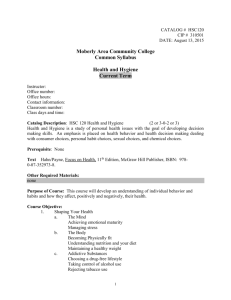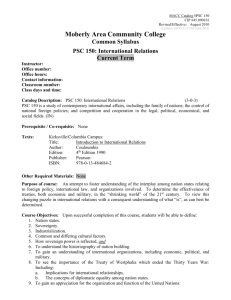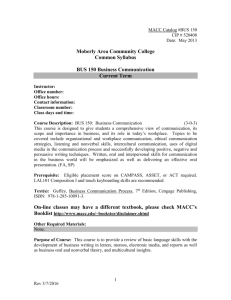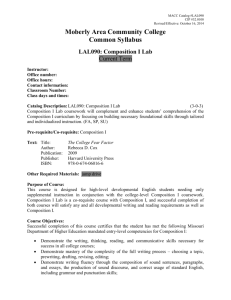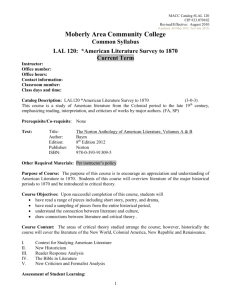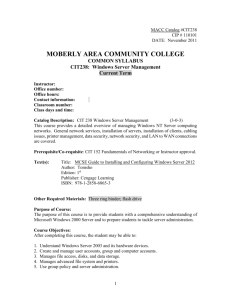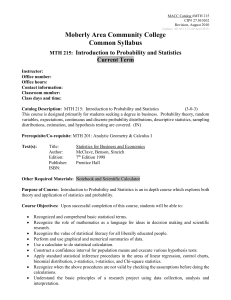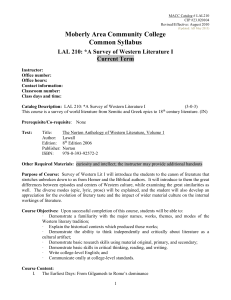PSC 105 Functions and Policies of American Government
advertisement
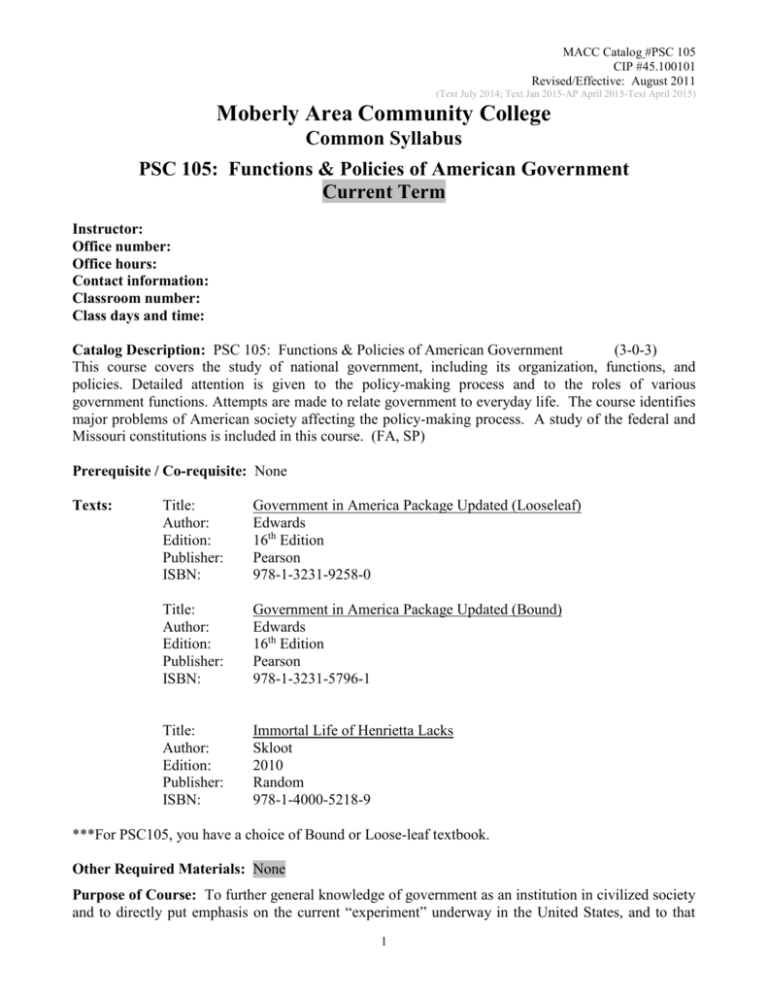
MACC Catalog #PSC 105 CIP #45.100101 Revised/Effective: August 2011 (Text July 2014; Text Jan 2015-AP April 2015-Text April 2015) Moberly Area Community College Common Syllabus PSC 105: Functions & Policies of American Government Current Term Instructor: Office number: Office hours: Contact information: Classroom number: Class days and time: Catalog Description: PSC 105: Functions & Policies of American Government (3-0-3) This course covers the study of national government, including its organization, functions, and policies. Detailed attention is given to the policy-making process and to the roles of various government functions. Attempts are made to relate government to everyday life. The course identifies major problems of American society affecting the policy-making process. A study of the federal and Missouri constitutions is included in this course. (FA, SP) Prerequisite / Co-requisite: None Texts: Title: Author: Edition: Publisher: ISBN: Government in America Package Updated (Looseleaf) Edwards 16th Edition Pearson 978-1-3231-9258-0 Title: Author: Edition: Publisher: ISBN: Government in America Package Updated (Bound) Edwards 16th Edition Pearson 978-1-3231-5796-1 Title: Author: Edition: Publisher: ISBN: Immortal Life of Henrietta Lacks Skloot 2010 Random 978-1-4000-5218-9 ***For PSC105, you have a choice of Bound or Loose-leaf textbook. Other Required Materials: None Purpose of Course: To further general knowledge of government as an institution in civilized society and to directly put emphasis on the current “experiment” underway in the United States, and to that 1 MACC Catalog #PSC 105 CIP #45.100101 Revised/Effective: August 2011 (Text July 2014; Text Jan 2015-AP April 2015-Text April 2015) end; to continually ask ourselves whether this government is fulfilling its proper function through observed policy. Course Objectives: Upon successful completion of this course, students will be able to: Understand the origin of “basic laws” in societies, and define the difference between these common or folk laws and those of a statute nature. Demonstrate knowledge of the philosophical and political foundations of American government. Analyze our first Constitution, the Articles of Confederation, and why it lacked the cohesive qualities for a truly national government. Examine the basic features of our Constitution in terms of the structure and function of American government, and compare these features to the structure and function of the Missouri state government as set up by the Missouri Constitution. Analyze the granting of civil liberties through the Bill of Rights, and how these civil liberties and civil rights have since been affected by subsequent constitutional amendments and by judicial decisions. Demonstrate knowledge of the role of political parties, government agencies, and the bureaucracy in fulfilling the aims of government. Analyze the “give and take” required for the American government to pay due attention to critical issues in both foreign and domestic policy. Demonstrate basic skills in critical thinking and reading. Write college-level English. Course Content: Philosophical and political foundations of American government: 1. Enlightenment thinkers and the foundations of the Declaration of Independence. 2. A new United States and the first attempt at an American government a. The Articles of Confederation – structure, strengths, and weaknesses 3. Road to the Constitution a. The Constitution amended – the Bill of Rights and the granting of civil liberties b. Later amendments and court cases further define civil liberties and civil rights. A study of the domestic application of the law: 1. Separation of powers at the national and state levels – the concept of checks and balances in government functions. a. Constructing legislation b. Enforcing legislation c. Interpreting legislation and the examination of pertinent court cases. 2. Bureaucracy: a. Civil Service b. Government Agencies 3. The evolution of political parties: a. Their role in elections and legislation b. A study of the major political parties on the contemporary scene 4. The role of the military establishment in a democratic republic 2 MACC Catalog #PSC 105 CIP #45.100101 Revised/Effective: August 2011 (Text July 2014; Text Jan 2015-AP April 2015-Text April 2015) The role of US foreign policy: 1. Economic strategies 2. Military arrangements 3. Direct relations with foreign nation states The Diplomatic Scene: a. How diplomacy is constructed b. The Department of State c. Embassies and Consulates 4. The United Nations 5. Uses of propaganda Assessment of Student Learning: 1 Four major examinations, combining essay and objective forms. 2. Quizzes 3. Discussion of examples of media sources 4. Written reports on a weekly basis concerning current problems. 5. A mid-term book review. 6. An end-of-term essay 7. Class discussion Grading Scale: A = 90-100 B = 80-89 C = 70-79 D = 60-69 F = 0-59 Class Work Class Participation: Quizzes: Exams: Essays: Book Reviews: 15% 10% 50% 10% 15% Description of Major Assignments / Projects: Per instructor’s policy Statement to Connect Course with General Education Outcomes or Technical Program Outcome Statement: In compliance with MACC’s General Education outcomes, the student who successfully completes this course will be able to: Demonstrate effective written and oral communication skills o The student will construct logical and ethical arguments with evidence to support the conclusions. o The student will conform to the rules of Standard English. o The student will analyze, synthesize, and evaluate a variety of course material and points of view. Assess and appreciate artifacts in language, art, music, or philosophy and be able to evaluate those artifacts as representations of form, cultural context, and individual expression. 3 MACC Catalog #PSC 105 CIP #45.100101 Revised/Effective: August 2011 (Text July 2014; Text Jan 2015-AP April 2015-Text April 2015) o The student will demonstrate critical thought in the evaluation of artifacts of diverse culture. Demonstrate knowledge of how history has shaped society and culture, understand how the individual relates to society and culture, appreciate cultural diversity, understand human behavior and mental processes, and understand human development. o The student will identify social and cultural changes over time. o The student will compare cultures. o The student will analyze the reciprocal relationship between the individual and culture. Instructor Policies: Academic Dishonesty: MACC board policy is as follows: “Academic dishonesty by students damages institutional credibility and unfairly jeopardizes honest students; therefore, it will not be tolerated in any form.” Forms of academic dishonesty include but are not limited to the following: violations of copyright law, plagiarism, fabrication, cheating, collusion, and other academic misconduct. Incidents of dishonesty regarding assignments, examinations, classroom/laboratory activities, and/or the submission of misleading or false information to the College will be treated seriously. The procedure for handling academic dishonesty is outlined in the Student Handbook (Policy Handbook M.010). In cases of alleged academic dishonesty, the burden of proof is on the student, not on the instructor. Attendance Policy: Any student who misses two consecutive weeks of class during a regular sixteenweek semester or the equivalent proportion of class time during a shorter session will be dropped from the class by the instructor unless acceptable justification is supplied. An instructor must complete and file the appropriate forms to drop the student within one week following the student’s violation of the attendance policy. Additionally, any student who misses more than one-fourth of the entire number of in-seat class meetings in a regular 16-week semester or the equivalent proportion of class time during a shorter session, may be dropped from that class by the instructor if, in the opinion of the instructor, the student does not have reasonable opportunity to succeed in the class. A student’s attendance rate will be calculated based upon the first day of the semester (not the student’s date of enrollment in the course.) Student attendance must be defined in a different manner for online, hybrid, and virtual courses. Student attendance in these courses is defined as active participation in the course. Online, hybrid, and virtual courses will, at a minimum, have weekly mechanisms for student participation, such as any or all of the following methods: a. Completion of quizzes or exams b. Submission of assignments c. Participation in threaded discussions d. Communication with the instructor A student who does not participate in an online, hybrid, or virtual course for two consecutive weeks will be dropped by the instructor unless acceptable justification is supplied. An instructor must complete and file the appropriate forms to drop the student within one week following the student’s violation of the attendance policy. As with ground courses, a student’s attendance rate in online courses will also be calculated based upon the first day of the semester. If a student does not demonstrate active participation in the online course within the first two weeks (or the equivalent 4 MACC Catalog #PSC 105 CIP #45.100101 Revised/Effective: August 2011 (Text July 2014; Text Jan 2015-AP April 2015-Text April 2015) proportion of class time during a short session), the student will be dropped as “never attended.” Simply logging into an online class does not constitute active participation. Students should be aware that their dropping a course and their last date of attendance in the course may impact their financial aid. (Policy Handbook I.090 and M.095) Tardiness: Per instructor’s policy Make-up and late work: Per instructor’s policy Extra-credit work: Per instructor’s policy Schedule of Student Assignments/Activities: 1. Assignments are made for writing and study for each class meeting. 2. Guide or study sheets are distributed for each assignment. 3. A collecting of current media items relating to government activity each week. ADA Statement Students who have disabilities that qualify under the Americans with Disabilities Act may register for assistance through the Office of Access and ADA Services. Students are invited to contact the Access Office to confidentially discuss disability information, academic accommodations, appropriate documentation and procedures. For more information, please call either the Moberly office at (660) 263-4100 x11240 or the Columbia office at (573) 234-1067 x12120, or visit our web page at http://www.macc.edu/index.php/services/access-office. Title IX Statement MACC maintains a strict policy prohibiting sexual misconduct in any form, including sexual harassment, sexual discrimination, and sexual violence. All MACC employees, including faculty members, are considered mandated reporters of sexual misconduct and as such are expected to contact the Title IX Coordinator when they become aware, in conversation or in writing, of an incident of sexual misconduct. For more information on this policy or to learn about support resources, please see http://www.macc.edu/sexual-misconduct-policy or contact Dr. Jackie Fischer, MACC’s Title IX Coordinator, at 660-263-4110, ext. 11236 or jackief@macc.edu. 5

